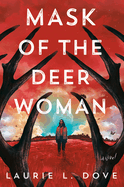
Laurie L. Dove's atmospheric, frequently grim, and emotionally charged debut, Mask of the Deer Woman, features a former police detective trying to outrun her old life by taking a job as tribal marshal on an Oklahoma reservation. Tasked with solving the cold cases of a growing number of missing Indigenous women and girls, she is inclined to focus instead on her own lost daughter.
Marshal Carrie Starr is the novel's protagonist, but Mask of the Deer Woman's chapters shift among various characters, beginning with Chenoa Cloud, a college student from the rez. Chenoa's disappearance into the Saliquaw Nation's backcountry sets the stage for Starr's arrival. The Bureau of Indian Affairs job is a last resort for Starr, and not one she relishes, but her daughter's murder and the man she subsequently gunned down ended her career as detective. Starr is half Indigenous, but out of touch with that part of her personal history. Trading on her late father's Saliquaw identity earns her a poorly appointed cinder-block office, a BIA-issued, broken-down Ford Bronco, and the locals' distrust.
Beyond the intoxicants she takes to escape her pain, Starr is knocked off-balance by tales of the Deer Woman. Part monster, part avenging angel, part capricious force of nature, this legend seems to follow the disoriented marshal, although the boundaries between magic, hallucination, and self-medicated grief are unclear. Political and commercial machinations accompany the missing women and the struggling tribal marshal in a novel of grief, violence, community, empowerment, and pain.
This dark mystery will thrill readers and immerse them in a powerfully portrayed world of great losses and high stakes. --Julia Kastner, blogger at pagesofjulia

